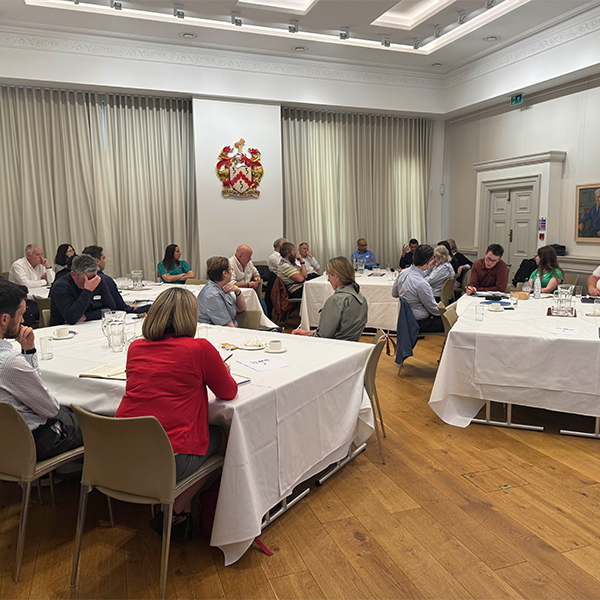
12 August 2024
British Furniture Manufacturers (BFM) has hosted a discussion event aimed at creating a consensus on fire regulations in the furniture industry.
With a broad range of representatives from sole traders and retailers to manufacturers and academics, the BFM Fire Regulations Roundtable brought together expertise from across the industry.
The aim of the event was to garner views on the proposed Flammability Regulations in a bid to understand the significance of the plans in relation to testing and standards, commercial viability, impact on circular economy and chemical transparency.
BFM MD Phil Spademan said: “What we’ve managed to do with this event is bring people with a wide variety of expertise, representing the whole spectrum of the sector, into one room to share their thoughts on the varying issues surrounding the proposed new fire regulations.
“This event was a first step towards the industry pulling together as a whole. From here, we can build, and consolidate, then start communicating with government via the BFC to lobby decision-makers and ensure they are aware of the issues in our industry.”
Held at the Furniture Makers Hall, London, the event included short presentations, a Q&A and four roundtable discussions.
David Fitzsimons was the main facilitator of the day. He said: “The UK has become an outlier globally in saying it’s more important to give people time to get out in the event of a fire, rather than avoid using chemical compounds in furniture that could have serious negative health effects.
“It’s why we’ve got so many different people in the room. All sorts of commercial implications and health effects are of concern.”
Ellen Percival, Jacob Lane, Paul Vaughan and Phil Spademan each led discussions at one of the tables, encouraging invited guests to share their perspectives on the pros and cons of the proposals, as well as posing wider questions to the groups.
Debates were interspersed with short presentations on specific topics, designed to trigger further discussion among the groups, with points of consideration shared at the end of each session.
The event was designed to ensure representatives from across the industry were able to attend and give clear feedback as part of a first step towards a collective view on the changes.
Phil Spademan added: “Although we don’t have an immediate solution, it is encouraging that the majority of people in the room seemed to be in favour of reducing chemical fire retardants from furniture and ultimately finding a safe route forwards to remove them completely”.
“From that perspective, the industry is aligned in making products healthier, safer, and fire resilient as well.
“It’s just been inspiring the amount of people who have given up their time from so many different levels of industry and different technical abilities. We’ve had people who work in one-man-bands to people who work for businesses with over 1200 employees, all putting their opinions together so we can have a consolidated view on how we move forward with the FR regs.”
What the attendees said...
Ian Oscroft, Whitemeadow: “It’s great to see the BFM has led the process of getting everybody together. It’s a voice that really does need to be listened to.”
Julie Walker, Technical Innovation Manager for VITA Foam UK: “The difficulty is re-generating Polyurethane raw materials from post-consumer mattresses that contain flame retardants. It is quite possible to mechanically recycle post-consumer foam into re-bonded foam products, but becoming fully circular to make new foam is inhibited by flame retardants - certainly with the technology we have today.”
Dr Joanna Cloy, Senior Project Manager at Environmental Charity Fidra: “By reducing the need for chemical flame retardants, and by improving supply chain chemical traceability, we can reduce pollution and ensure effective fire safety. My focus is protecting the environment, but we also need to understand the importance of compliance and businesses being viable and being able to afford to make necessary changes.”
Professor Richard Hull, Professor of Chemistry & Fire Science at the University of Central Lancashire: “Consumers are exposed to harmful flame-retardant chemicals that are leaching out of the sofas and found in household dust. The UK has the highest concentrations of flame retardants in household dust of anywhere in the world and that’s particularly bad for infants and toddlers.”
Joel Rosenblatt, Chairman, Buoyant Upholstery: “There’s certainly a feeling that the amount of testing that’s being thrown our way is out of proportion to the benefits it’s going to bring.”
Angela Moran, Product Strategy Director, Silentnight Group: “There was a general agreement that we must reduce our reliance on chemical flame retardants.”
Phil Spademan, BFM MD: “It’s been inspiring. As the BFM, it’s fantastic to bring this wide range of people together so we have a consolidated view on how we can move forward with the FR regs.”
Paul Vaughan, BFM Technical Service Consultant and DFS Quality Manager: “It's clear that many industry experts in one room are of very similar and positive viewpoints regarding the industry movements, however, also clear are the many unknowns. From UK manufacturing to importing, startups and SMEs to large manufacturers and multinational store businesses, the unknowns are very concerning to all. Introducing a technical risk-based approach needs levels of expectation clearly defined in the consultation response.”

